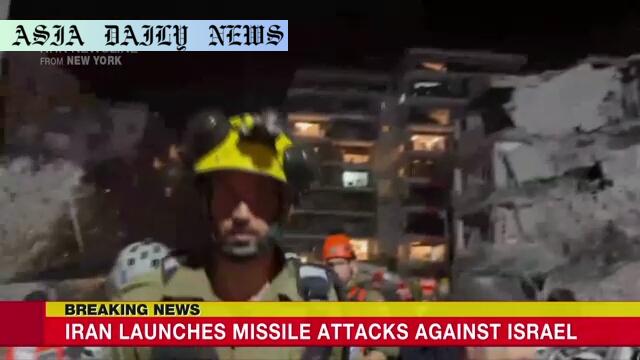Iran-Israel Conflict: Iranian forces launched ballistic missile attacks against Israel, escalating tensions in the Middle East.

Iran Retaliates Following Devastating Israeli Attacks
The longstanding tensions in the Middle East have taken a catastrophic turn as Iran launched hundreds of ballistic missiles against Israel in retaliation for aggressive Israeli airstrikes on over 100 Iranian military facilities. The conflict began when Israeli forces targeted Iranian positions, reportedly resulting in the deaths of 78 people and injuries to over 300. Iran’s response, coordinated by the Islamic Revolutionary Guard Corps, sought to cripple dozens of strategic military locations in Israel, including airbases and other critical installations. The result of these retaliatory strikes includes at least 40 injured individuals on the Israeli side, underscoring the severe toll the conflict is taking on both nations.
Israeli Prime Minister Benjamin Netanyahu’s statement following the retaliation emphasized further escalation, throwing the already unstable region into uncertainty. Meanwhile, Iran has expressed outrage, with Supreme Leader Ayatollah Ali Khamenei accusing Israel of initiating a reckless conflict with dire global implications. Khamenei has described the initial Israeli attacks as a “great crime,” promising further retaliation that could shift the regional balance of power significantly.
The Human and Strategic Losses
The damage on both sides extends beyond military losses. Iranian reports confirmed the deaths of key military leaders, including Armed Forces Chief of Staff Mohammad Bagheri and the head of the Islamic Revolutionary Guard Corps, Hossein Salami. These losses have been described as setbacks for Iran, but officials have assured the public of a swift military reorganization. Conversely, Israeli citizens remain on edge as the specter of further conflict and the possibility of civilian casualties loom large. The human toll, including the injured and displaced, highlights the wider impact of this escalating regional confrontation.
Global Reactions and International Implications
The international community has been quick to respond, with widespread concern about the rapid escalation and its broader implications. The United States, through comments from former President Donald Trump, highlighted the use of American military equipment in Israeli operations. Trump’s remarks also suggested that the current conflict might press Iran into negotiating a nuclear agreement, though such discussions seem unlikely amidst the immediate violence. Meanwhile, the United Nations and various humanitarian organizations have called for restraint, worried that the conflict could lead to a wider regional or global confrontation involving key powers like the U.S., Russia, and China.
The Ripple Effect Across the Middle East
This latest flare-up threatens to destabilize the entire Middle Eastern region, where geopolitical alliances and ongoing conflicts create a highly volatile environment. Countries such as Lebanon, Syria, Iraq, and others remain on high alert, fearing the spillover effects of the Iran-Israel confrontation. Many of these nations host both Iranian-backed groups and organizations sympathetic to Israel, creating a precarious balance that could collapse under a slight miscalculation. Furthermore, the destruction reported near Iran’s uranium enrichment facility in Natanz raises grave concerns about nuclear safety and the potential for an environmental or humanitarian disaster.
What Lies Ahead?
As both Iran and Israel vow further retaliation, the situation in the Middle East appears set to worsen. Statements from leaders on both sides exhibit a determination to continue hostilities. The Iranian leadership sees this as a moment to demonstrate its resilience and capacity for retribution, while Israeli officials emphasize the need to obliterate any threats to national security. The question remains whether diplomatic channels can be opened before the conflict spirals into an all-out regional war with far-reaching global consequences.
Commentary
The Complex Web of Middle Eastern Geopolitics
The Iran-Israel conflict represents one of the most complex and enduring geopolitical challenges of our time. It is rooted in a deep history of mistrust, regional rivalries, and ideological divisions. While this particular escalation is severe, it is far from the first such incident between the two nations. These confrontations remind us of the intricate power play that dominates the Middle East, a region shaped not only by local dynamics but also by the strategic interests of superpowers from outside.
Potential Consequences for Regional Stability
The consequences of this conflict ripple far beyond Iran and Israel, threatening to destabilize an already fragile Middle East. With groups such as Hezbollah in Lebanon and factions in Syria heavily influenced by Iran, the spread of violence into neighboring countries is a real possibility. Additionally, Israel’s robust military response will only heighten the risk of escalations drawing in other actors, possibly creating a situation akin to a multi-front war. This conflict underscores just how interconnected the stability of the Middle East truly is.
The Role of International Actors
The reactions from international powers are crucial in determining how the current escalation will unfold. The remarks by former President Trump on the conflict suggest backing for Israel, emphasizing their shared interests and military cooperation. However, this support complicates potential diplomatic resolutions. A more balanced approach from other nations, particularly European powers or the United Nations, may yet provide a sliver of hope for de-escalation. Ultimately, global actors have a vital responsibility in mediating conflicts to prevent unchecked violence and its devastating human cost.
A Call for Restraint and Diplomacy
As the violence continues, the need for diplomacy becomes ever more critical. Both Iran and Israel are powerful actors whose actions could easily spiral out of control in unpredictable and catastrophic ways. History has shown us time and again that military solutions, especially in deeply entrenched conflicts such as this one, often result in greater devastation, displacement, and long-term instability. It is imperative that the international community advocates for restraint and pursues channels of dialogue before the cost of continued violence becomes insurmountable.


